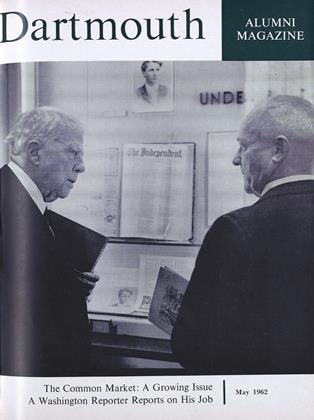Opposes Undergraduate Specialists
TO THE EDITOR:
Professor John G. Kemeny's article in the March 25 issue of The New York TimesMagazine should have aroused the interest of any individuals concerned with the future of American college education - and of Dartmouth education in particular.
I grant that Dr. Kemeny's introductory observations (that it is impossible to be an expert in all fields of modern human endeavor; and that "well-roundedness" is too frequently equated with general mediocrity), though hardly original with him, are quite valid. In proposing a new policy of student admissions in order to overcome these difficulties, however, it seems to me that Dr. Kemeny has struck a blow at the very root of Dartmouth's educational philosophy.
He suggests that each freshman class, while constituting a well-rounded unit, should be composed of individual specialists chosen primarily by the individual academic departments on the basis of their promise.
Dr. Kemeny's mathematics department might, I suppose, fare quite well in the attempt to find the sort of candidates which he desires; but I suspect that the philosophy, geology, religion, and anthropology departments (to name just a few) would be hard pressed to locate prospective specialists. There are, to be sure, a certain number of secondary and preparatory school graduates who are quite determined and qualified to pursue a particular specialized field of study from the first day they set foot on the college campus. The vast majority of college freshmen, however, have had little or no contact with, and hence little or no opportunity to demonstrate interest in or aptitude for, many of the fields which are opened to them at a liberal arts college.
Moreover, I cannot help but feel that Dr. Kemeny's proposed system would lead inevitably to the development of a rigid and highly specialized curriculum which would offer little opportunity to the many students who, as I once did, arrive on the campus with the hope of finding a particular academic interest rather than with the intention of pursuing one which they have already developed. The number of Dartmouth students who eventually major in fields which they hadn't even considered before arriving in Hanover, and the number of freshman "specialists" who become disenchanted. with their initial academic passion, provides sufficient reason for maintaining Dartmouth's educational traditions.
For those who can approach a college education with a background sufficiently broad (or a foresight sufficiently narrow) to permit their immediate and total commitment to a particular field of study, the map is dotted with many fine institutions which are expressly dedicated to the fullest possible development of specialized interests and talents. But may the Hanover Plain continue to be a refuge for those students who still have a few questions to ask, a few doubts to be probed, and a few ideas to be tried before they will allow themselves to be harnessed to anyone's academic wagon!
Cambridge, Mass.
A Footnote for Prof. Kemeny
TO THE EDITOR:
A footnote might be helpful in connection with Professor John Kemeny's recent article in The New York Times Magazine entitlied "Needed: Well-Rounded Colleges." It would read thus:
Dartmouth has been committed to the policy of a well-rounded college since least 1926 when President Hopkins said to a Boston meeting: "It remains indispensable in a college, I believe, that given the capacity for acceptance and appreciation of interests pertaining to the mind, we should have men of diverse types, varied personalities, representative of different social groups and of different geographical zones." (This Our Purpose, p. 177) "
This policy was recently affirmed by the Board of Trustees when it adopted the report of the Cantril Committee which read in part as follows: "We do not believe there is an ideal Dartmouth type; we do believe there are, or should be, many ideal Dartmouth types. The Dartmouth campus must like a healthy democracy, be something of a pluralistic society."
It is probable that other institutions which have followed Dartmouth's lead in admissions and the selective process, have also been seeking for many years the well-rounded class. Among these undoubtedly is Professor Kemeny's alma mater Princeton as witness the author's description of his own academic experience there.
It would take more than a footnote to discuss his interesting tongue-in-cheek critique on the well-rounded student. In brief, however, Professor Kemeny apparently agrees that mere circumference is not enough whether one is measuring men or colleges. Rather it is the length and quality of the radius that is vital.
Denver, Colo.
 View Full Issue
View Full Issue
More From This Issue
-
 Feature
FeatureCOMMON MARKET
May 1962 By WALDO CHAMBERLIN -
 Feature
FeatureA Reporter in Washington
May 1962 By ERNEST L. BARCELLA '34 -
 Feature
FeatureSGT. BROWN'S RUGGED BOYS
May 1962 By CLIFF JORDAN '45 -
 Feature
FeatureThe Dictionary's Function
May 1962 By PHILIP B. GOVE '22 -
 Feature
FeatureDartmouth in the Public Service
May 1962 -
 Feature
FeatureMUSIC ADVISORY GROUP TO AID HOPKINS CENTER
May 1962
Letters to the Editor
-
 Letters to the Editor
Letters to the EditorFROM ONE OF THE OLDER ALUMNI
December 1916 -
 Letters to the Editor
Letters to the EditorLetters
March 1942 -
 Letters to the Editor
Letters to the EditorLetters
June 1956 -
 Letters to the Editor
Letters to the EditorLETTERS TO THE EDITOR
FEBRUARY 1963 -
 Letters to the Editor
Letters to the EditorLetters to the Editor
DEC. 1977 -
 Letters to the Editor
Letters to the EditorTaking Our Medicine
OCTOBER 1997

